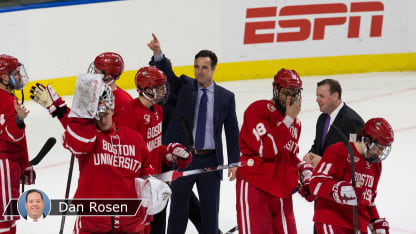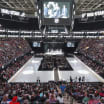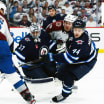David Quinn, the new coach of the New York Rangers, was trying to figure out the next step in his career, whether to play it safe and stay at Boston University or take the plunge into the deepest waters of the business.
So Quinn turned to Mike Sullivan, the two-time Stanley Cup-winning coach of the Pittsburgh Penguins and a friend going back to their days as teammates at BU. He needed Sullivan's advice as much as he needed a friend's ear to bend.
Quinn will be success as Rangers coach, Sullivan says
Competitiveness, communication skills seen as strengths by Penguins two-time Cup winner

"I talked to him a few times about it and I just tried to help him think through the decision on some of the differences, the position he's in at BU and what he would be getting involved with if he was the head coach of the Rangers," Sullivan said. "As I said to him, 'You're in a great position because no matter which decision you make you're in a terrific spot.' I know he loves BU, as all of us who have gone there do. He loved his job there as well, and that's what made it difficult. He loves his players, and I think to a certain extent he felt as though he had a little bit of unfinished business, because I know he had such passion to want to win a national championship and they were knocking on the door a few times. I just tried to help him think through the process a little bit and weigh some of the pros and cons with each position. At the end of the day, as I said to him, 'It's really going to come down to your instinct.'"
RELATED: [Rangers hire Quinn as coach]
Quinn's instinct was to become coach of the Rangers, a position the 51-year-old accepted Wednesday.
Coaching professional hockey isn't new to Quinn. He was an assistant with the Colorado Avalanche in 2012-13 and coached Lake Erie of the American Hockey League from 2009-12.
He was coach at BU since 2013, going 105-67-21 and reaching the NCAA championship game in 2015, where it lost to Providence 4-3.
The Rangers roster includes 11 players who played NCAA hockey, including defenseman Kevin Shattenkirk, who played at BU from 2007-10. Quinn was an assistant under coach Jack Parker during Shattenkirk's first two seasons and then coached him in the AHL.
"I think the Rangers are getting a really good coach," Sullivan said.
Sullivan said he wasn't sure which way Quinn was leaning because of his passion for BU. When he heard Quinn was going to the Rangers, it didn't surprise him, especially because he remembers Quinn's drive to reach the NHL as a player and how that dream was taken away from him.
Quinn was the No. 13 pick in the 1984 NHL Draft by the Minnesota North Stars. He was diagnosed with Christmas disease, a blood disorder, in 1986, and a year later, after finishing his junior season at BU, was told he needed to stop playing.
He got the disease under control enough to sign a professional contract with the Rangers in 1992 but never reached the NHL as a player. He turned to coaching in 1994.
"He's just a real competitive guy and probably deep down part of the motivation for his decision was wanting to be at the highest level of the game, the pinnacle of the sport," Sullivan said. "And that's where he is."
Sullivan said he believes his friend has the chops to make it. He said Quinn's best quality is his ability to communicate with his players.
"He will build relationships and I think that's how you get the most out of players," Sullivan said. "Don't get me wrong, he's got a good command of the Xs and Os and he'll be a prepared guy … but if you ask me what I think his biggest strengths is, it's building relationships."
Minnesota Wild forward Jordan Greenway said Quinn was hard on him during his two seasons at BU but always was approachable and fueling his confidence.
"He's a coach you can go up to all the time, and if you're playing bad or just don't like the way your game is going, you just want to be like 'Coach, I need some help,' and he helps you out and does video," Greenway said.
BU freshman forward Brady Tkachuk, one of the top prospects for the 2018 NHL Draft, credited Quinn for being "optimistic, charismatic and passionate."
"He's a big communicator in between periods," Tkachuk said. "When we're not playing so well, he's definitely getting on us and telling us to wake up. Whatever he does, whether he's hard on us, he's always the biggest supporter of our team. ... I'm going to miss him."
There is a difference between coaching college players and pros. It's an adjustment Quinn will have to make, but Sullivan said Quinn's experience coaching pros should allow him to make it seamlessly.
"He's a very personable guy, a likeable guy, a guy who is going to bring a lot of passion to the rink," Sullivan said. "He loves hockey, loves being a part of it. I think that passion for the game is going to be infectious. He's a real good coach, a good teacher. I think he's going to bring that to the table at the pro level with the young Rangers team."
NHL.com staff writer Mike G. Morreale contributed to this report.

















